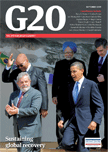

 |
 |
|

Pittsburgh:
Bridging the Washington-London G20 Summits and Beyond
By Lee Myung-bak, president, Republic of Korea
[Korean]
To download a low-resolution pdf, click here. (Be patient! It's 7.7 MB.)
It is my sincere hope that the G20 leaders in Pittsburgh will agree on the fourth G20 summit where a full discussion on post-crisis global economic management and sustainable and balanced growth models can take place
Thanks to globally concerted policy endeavours, especially through the G20 summit process, the world economy now seems to be hitting the bottom of the worst financial and economic crisis since the Great Depression of the 1930s.
Naturally, there are voices calling for the immediate implementation of exit strategies to unwind the unprecedented policy measures taken by most G20 members.
Calls for exit strategies are also heard in Korea, where the recovery process, although fragile, started earlier than in most economies in the Organisation for Economic Co-operation and Development (OECD). I strongly believe that there are still substantial downside risks in the global economy. However, this does not prevent me from emphasising the importance of preparing well-sequenced exit strategies to be implemented in the coming months.
I hope that the G20 leaders recognise the need to properly prepare exit strategies for future implementation in a timely manner when the global recovery takes a firm hold. Such recognition will send a positive message to the world, the financial community in particular, clearly showing that leaders are mindful of the future risk of inflationary spirals. Yet the global community should be more wary about the possibility of falling back into a double-dip recession as a consequence of premature withdrawal of the rather effective policy measures taken so far.
Furthermore, I would like to re-emphasise the fact that what made the current global financial and economic crisis different from the Great Depression in its severity and duration is definitely the globally concerted policy endeavours mounted, especially on the part of the G20. By the same measure, the importance of concerted action in implementing exit strategies cannot be overstressed. I would like to see the G20 leaders agree on general principles on the implementation of exit strategies, leaving the timing to individual countries (as in the case of dealing with impaired assets, as I previously suggested in ‘How Korea Solved Its Banking Crisis,’ in the Wall Street Journal last March).
In preparing for the London Summit, as a member of the governing troika of the G20, Korea made a strenuous effort to produce deliverables. Fortunately, the London Summit did produce several important outcomes. Now the leaders should make every effort to ensure that those deliverables are properly followed through.
In the follow-up process, the G20 leaders should pay special attention to the needs and causes of emerging and developing countries. To this end, one of the proposals that Korea has advanced is the establishment of a trust fund consisting of new special drawing rights to be allocated for developed economies and economies with large foreign reserves for the benefit of non-G20 emerging and developing countries. The G20 should also continue to try to further increase the voice and representation of the emerging and developing world, to reflect global economic reality more closely.
At Pittsburgh, it is imperative for the leaders to reiterate and strengthen their pledge for the conclusion of the Doha round of trade negotiations by 2010, as agreed by the G8 leaders at the L’Aquila Summit last July, along with the reaffirmation of standstill and rollback commitments. The World Trade Organization should continue to carry out its intensive monitoring work.
In addition to following up, leaders should be concerned with future growth models that will help bring sustainable and balanced growth after the crisis by rebalancing the demand structure within individual economies, the development gaps between North and South, and energy sources supporting green growth. In this light, the leaders may task the International Monetary Fund, the World Bank, the OECD and other relevant multilateral institutions with producing policy recommendations on post-crisis global economic management for discussion at each level of the G20 process in the lead-up to the next G20 summit in 2010. In addition, the G20 leaders might also want to utilise the newly established working groups or task forces for the same purpose.
As seen in the coordinated response to the current crisis through the G20, the positive effects of globally coordinated policy responses far outweigh unilateral actions by individual countries combined. The G20 summit process has already shown its usefulness in effectively dealing with major global issues for speedier globally concerted actions. It is my sincere hope that the G20 leaders in Pittsburgh will agree on the fourth G20 summit where a full discussion on post-crisis global economic management and sustainable and balanced global growth models can take place.
Furthermore, at the fourth G20 summit the leaders should seriously consider the institutionalisation of the G20 process as a means to strengthen global governance.
|
This Information System is provided by the University of Toronto Library |
All contents copyright © 2024. University of Toronto unless otherwise stated. All rights reserved.